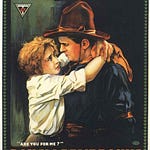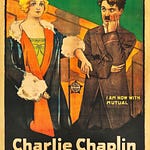This is my least favorite of any of the films I’ve watched thus far. It’s 52nd out of 52. Which is not to say that I hated it, not by any stretch. There were some moments I enjoyed, but as a whole it is a heavy-handed, predictable platitude of a film.
The film opens in the difficult-to-pronounce, and wholly fictional, kingdom of Wredpryd, which despite its phony name is clearly meant to represent Germany. Wredpryd’s king, a very Kaiser-like fellow, has been talked into declaring war by some of his aides. He’s delighted to learn that Count Ferdinand, a Wredprydian, if that’s the proper term, has invented a fantastic new war machine: the submarine. Off into battle goes the Count, as pilot of his new invention. Meanwhile, back home, the women of Wredpryd band together to form an anti-war coalition, saddened as they are by the loss of their husbands, sons, and fathers to the brutality of the battlefield.
So far, it sounds pretty good, doesn’t it? And at this point, I was onboard. However, the film takes something of a preachy turn. Count Ferdinand is ordered to launch a torpedo at a passenger boat which he’s told is secretly carrying war supplies. He’s about to give the order to fire when he has a vision of the aftermath of his actions. He sees the ship sinking, and the deaths of the innocent passengers. This scene is effective, and well-shot. It’s an exciting, grim depiction of war. Unwilling to kill innocent people, he refuses the order to fire. His crew turns on him, and he attempts to fight them off, which leads to the destruction of the submarine, and the deaths of many, possibly all, of its crew.
It seems Ferdinand has died to, for we catch up with him in Purgatory, where he meets Jesus. Jesus is pretty sad about the war, and that he did the right thing by not sinking the boat. He let’s him know that together they’re going to solve this whole war thing, and tells him he’s going to return to Earth in the Count’s body. So back to the land of the living goes Ferdinand, with Jesus along for the ride.
Despite having a halo when he is brought before the king, Ferdinand is sentenced to death for his treason. In jail, he’s bathed in the light from a glowing star as are the nuns in a nearby convent, which while a little goofy story-wise is brilliantly executed and makes for a stunning visual onscreen. Soon the whole nation has seen the same light, and as a whole the population marches on the capital with a message of peace.
Eventually the king visits the prisoner, and this time around he is awed by the presence of a higher power. While the king watches in shock, Jesus steps out of the sleeping Count’s body and guides him through a vision of the horrors of war, culminating in a glimpse into Jesus’ big book of sinners, which includes the king’s name. Horrorstruck, the king bows before Jesus and pleads with him for mercy. Jesus backs away and vanishes, and the king finds himself back in the cell with the Count.
Naturally, the king has been humbled, and immediately announces the end of the war. While he does this, Jesus wanders the battlefield blessing those who have fallen. In the streets, the mob of nuns rejoicse, as do the citizens of the nation. Everyone young and old comes rushing out from every nook and dell to crowd the city streets in celebration of peace. We’re given a full 7 minutes of rejoicing before the film closes, and as the blare of the war bugle is replaced by the shepherd’s horn, the screen fades to black.
The finale was the strongest sequence in the entire film. The celebrating citizens of Wredpryd was a lot of fun to watch, especially after the dreary, preachy middle section of the movie.
Like The Birth of a Nation, Civilization is a clear call to avoid the growing war in Europe. However, where The Birth of a Nation did so with a compelling vision of the atrocities of war, and told an entertaining story at the same time, Civilization fails in both regards. It beats its audience over the head with pacifist imagery for an hour and change, while never offering any plot beyond “war is bad.” Director Thomas H. Ince spent a year making the film, and allegedly spent $1 million in doing so, though other reports say that was a Hollywood exaggeration, and it in fact cost only $100,000 to make. Whatever he spent, in my estimation it was wasted, because this film just isn’t very good.
I watched this on YouTube, and you can watch it below if you like. The linked version includes the film’s original score. Despite being labeled as a 1916 film, Civilization premiered on December 31st, 1915. I can think of many better ways to have ushered in 1916 than to have watched this film.
Next I’m watching Where Are My Children? [1916], directed by Phillips Smalley and Lois Weber.














Share this post